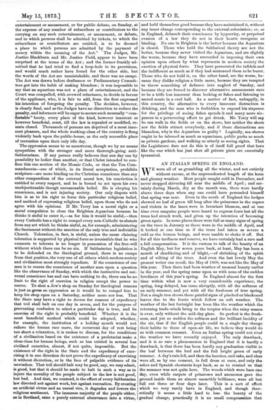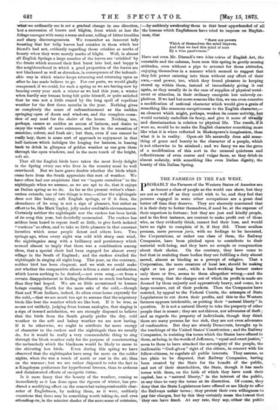AN ITALIAN SPRING- IN ENGLAND.
WE were all of us grumbling all the winter, and not entirely without excuse, at the unprecedented length of the keen and gloomy weather. Most people caught cold in December, and
never stopped shivering till near the middle of April ; and cer- tainly during March, dry as the month was, there were hardly above three days when any one could have persuaded himself that spring was near. Even in the south of England the hedges showed no leaf of green till long after the primroses in the copses and violets in the lanes were in luxuriant blossom, and at one time even sanguine people were heard to express fears lest all the trees had struck work, and given up the intention of becoming green again. In some places there were full as many signs of spring
on the trees in January as there were in the middle of April, and it looked at one time as if the trees had taken as severe a cold as the human beings, and were unable to shake it off. But for all this tardiness and reserve, we have certainly had a rare and a full compensation. It is the custom to talk of the beauty of an English May, but for seven years back, at least, May has been a month of shuddering and of blight,—of shrinking of the spirit and of wilting of the trees. And even the last lovely May the present writer can recall, the May of 1868, was not like the May of this year. Then there had been weather of unusual beauty earlier in the year, and the spring came upon us with none of the sudden loveliness of this year's spring. In England almost for the first time within what is now a very considerable experience, the spring, long delayed, has come abruptly, with all the softness of an early summer, and yet with all the freshness of true spring. Not a single tree shows those painful signs of pinched or blackened leaves due to the frosts which follow on soft weather. The weather of the last fortnight has been like the weather which the returning trade-winds bring to the tropics when the rainy season is over, only without the mid-day glare. So perfect is the fresh- ness, and yet so sudden the softness and the brilliant lucidity of the air, that if the English people could in a single day change their habits to those of open-air life, we believe they would do so with common consent. Even an Italian spring could not rival the weather we have recently enjoyed. The only drawback, and it is so rare a phenomenon in England that it is hardly a drawback, is that there has been hardly any graduation visible in the leaf between the bud and the full bright green of early summer. A day's rain fell, and then the beeches, and oaks, and elms were all, as by one consent, in full dress at once, and only the ashes and Spanish chestnuts kept back, so as to remind as that the summer was not quite here. The woods which were bare one day, even while carpets of primroses and anemones gave the ground inside them an almost unearthly brilliance, were all but full out three or four days later. This is a sort of effect which we very rarely have in England, and though theo- retically it seems a little hard to lose the beauty of the gradual change, practically it is no small compensation that
Astat we ordinarily see is not a gradual change in one direction but a succession of bursts and blights, from which at last the foliage emerges with many a seam and sear, telling of bitter troubles and' sharp discouragementa We remember an innocent lady boasting that her tulip leaves had crinkles in them which her Mend's had not, evidently regarding those crinkles as marks of beauty when they were merely marks of blight. Well, in almost alk English Springs a large number of the leaves are crinkled' by the frosts which succeed their first burst into leaf, and happy is the neighbourhood in which a good proportion of the leaves are not blackened as well as shrunken, in consequence of the indomit- able way in which winter keeps returning and returning upon us after he has made believe to go. For our parts, we would gladly .compound, if we could, for such a spring as we are having now by -bearing every year such a winter as we had this year, a winter when hardly any human being felt quite himself, or quite satisfied that he was not a little crazed by the long spell of repellent weather for the first three months in the year. Nothing gives se completely the sense of enfranchisement as the sudden springing-opet of doors and windows, and the complete cessa- tion of any need for the shelter of the house. Nothing, too, perhaps, cantos se sudden an access of laziness, and desire to .enjoy the wealth of mere existence, and live in the sensation of -sunshine, colour, and fresh air ; but then, even if one cannot be really lazy, there is some sort of approach to enjoyment in that half-laziness which indulges the longing for laziness, in leaning book to drink in glimpses of golden weather as one gets them through the open windows, and in the mere touch of the bright, soft air.
That all the English birds have taken the most lively delight in the Spring every one who lives in the country must be well onnvinced. But we have grave doubts whether the birds which conic here from the South appreciate this sort of weather. We have often had our suspicions that we "impute ourselves" to the nightingale when we assume, as we are apt to do, that it enjoys an Italian spring as we do. As far as the present writer's obser- vation extends, one of two things is true,—either the nightingale does not like balmy, soft English springs, or if it does, the abundance of its song is not a sign of pleasure, but rather an effort to be, like Mark Tapley, jolly under creditable circumstances. Certainly neither the nightingale nor the cuckoo has been lavish of its song this year, but decidedly economical. The cuckoo has seldom been heard to repeat itself so little, to give forth isolated 4'eukoos" so often, and to take so little pleasure in that constant iteration which some people detest and others love. Two springs ago, when every night was cold with sharp east wind, the nightingales sang with a brilliancy and persistency which seemed almost to imply that there was a combination among them, that a special choir had been engaged for almost every village in the South of England ; and the cuckoo rivalled the nightingale in singing all night long. This year, on the contrary, neither bird has been eloquent, and we wish we could make -out-whether the comparative silence is from a state of satisfaction which leaves nothing to be desired,—not even song,—or from a
• eertain disappointment in finding the climate so much less bracing than- they had hoped. We are so little accustomed to human beings coming North for the mere sake of the cold,—though East and West Indians, indeed, do often come home expressly for the cold,—that we are much too apt to assume that the migratory birds.like best the weather which we like best. If it be true, as seems not unlikely, judging from human analogies, that singing is sign of inward satisfaction, we are strongly disposed to believe that the birds from the South greatly prefer the dry, cold -weather to the soft and balmy weather we are now having. If it be otherwise, we ought to attribute far more energy of character to the cuckoo and the nightingale than we usually do, for it would be really a very commendable thing to sing through the bleak weather only for the purpose of counteracting the melancholy which the blackness would be likely to cause to the shivering hen birds. Even during this spring we have observed that the nightingales have sung far more on the colder nights, when the was a touch of north or east in the air, than on the warmer ; but we are rather disposed to refer the fact to Kingsleyan preference for hyperboreal breezes, than to arduous and disinterested efforts of energetic virtue.
Is it mere fancy that the beauty of the weather, coming so immediately as it has done upon the rigours of winter, has pro- Ataoed a modifying effect on the somewhat unimpressionable char- acter of Englishmen, by making them, as it were, suddenly -conscious that there may be something worth taking-in, and even attending-to, in the minuter shades of the mere sense of existence, —by--suddenly' awakening them to that least' apprehended of all the lessons which Englishmen have tried to impress on English- men; that
"there are powers Which of themselves the mind impress, And that we feed this mind of ours By a wise passiveness."
Have not even Mr. Disraeli's two bites soiree of English Art, the constable and the cabman, been seen this spring in gently musing attitudes, even without a pipe to account for those attitudes, enjoying themselves in a manner which seemed to suggest that they felt power entering into them without any effort of their own,—and power, too, which they found pleasure in keeping stored. up within them, instead of immediately giving it out again, as they usually do in the case of supplies of physical nutri- ment or stimulus, in. their ordinary energetic but unlovely ex- pletives. If we had but more seasons like this, we can even conceive a modification of national character which would give a grain of something like sensuous receptiveness' to the English character,— an element which might, perhaps, weaken its coarse activity, but would certainly embellish its fancy, and give it more of vivaeity and. discrimination in relation to physical life. The result, if it were so, would be to make the English character something, more like what it is when reflected in Shakespeare's imagination, than what it is in reality. Open-air life assuredly does add, some- thing of grace and beauty to the character of a people, which is not otherwise to be attained ; and we fancy we see the germ of a modification of this sort in the unusual quietness and reflectiveness of even coarse and vulgar faces, as they drink-in almost sedately, with something like even Italian dignity, the beauty of this Italian Spring.



































 Previous page
Previous page